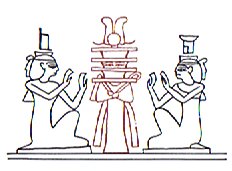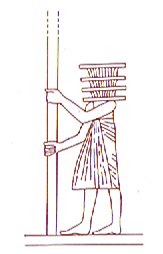The Polynesian ivi means both 'bone' (ivi tika = backbone, fishbone) and 'parent, family, ancestry'. On Easter Island and up in the Arctic bones are more easy to obtain than wood. Wood is associated with fire and fire with the sun and the stars. Bones are associated with skeletons and dead people, and from there the thoughts go up to the sky where the 'fishes' are. If bones and pieces of wood are associated with periods of time (which seems obvious from all we have seen so far), then bones may be seen as substitutes for pieces of wood. However, already in ancient Egypt the backbone (djed) was a very important sign for stability, dominion, protection, life and health (according to Wilkinson), i.e. not associated with the dead. The four divisions of djed presumably mark the four quarters:
From this I draw the conclusion that bones and pieces of wood are hard, dry and stable ('male'). 'Woman' is the opposite: soft, unstable and watery, the 'joints' between the 'bones'. |


